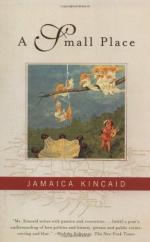
|
| Name: _________________________ | Period: ___________________ |
This test consists of 15 multiple choice questions and 5 short answer questions.
Multiple Choice Questions
1. What is now situated above a dry-goods store?
(a) The school.
(b) The narrator's life.
(c) The hospital.
(d) The library.
2. What does the narrator praise in Section 4?
(a) Her own intelligence.
(b) The justice of the way that the English treat the Antiguans.
(c) The poverty of the Antiguans.
(d) The beauty and wonders of Antigua.
3. Why is the narrator offended by the reference to "her girls," as stated by the lady whose family established the Mill Reef Club?
(a) Because the lady discourages her girls from reading.
(b) Because "her girls" are grown Antiguan women.
(c) Because the lady states that her girls should get married young.
(d) Because her girls are illiterate.
4. Who in Section 4 is described as submerged in the unreality of Antigua?
(a) No one.
(b) Real people.
(c) The narrator.
(d) The English.
5. How does the narrator describe the English?
(a) As rubbish and a selfish, miserable disease.
(b) As noble and exalted.
(c) As disheartened and homesick.
(d) As excited to experience new things.
6. What did the Antiguans hope the second Prime Minister would bring to Antigua?
(a) Happiness.
(b) The Antiguans had no hopes for the second Prime Minister.
(c) Luxury and relaxation.
(d) Honesty and prosperity.
7. During the second Prime Minister's term, what happened to the sugar industry?
(a) It never existed.
(b) It went bankrupt.
(c) It ceased to exist.
(d) It profited.
8. What does the swindler from the Far East help build?
(a) Condominiums for Americans.
(b) The Redonda stamps.
(c) West Indies Oil Refinery.
(d) The Antiguan library.
9. What do Antiguans call Bird's ruthless son?
(a) Doctor Jekyl.
(b) Doctor Dolittle.
(c) Papa Doc.
(d) Papa Poverty.
10. What is Bird's ruthless son dying from?
(a) A blood disease.
(b) A brain tumor.
(c) Cancer.
(d) Starvation.
11. What does the author say in Section 4 is so beautiful that it is unreal?
(a) The natives.
(b) Religion.
(c) Antigua.
(d) The neighboring islands.
12. Whose beautiful poorness is unreal?
(a) The narrator's.
(b) The villages'.
(c) The English's.
(d) The slaves'.
13. What happens to honest ministers which encourages other ministers to be corrupt?
(a) They must stand trial for treason before the Antiguan government.
(b) They suffer poverty after their term ends.
(c) They are mocked and ridiculed.
(d) They are murdered.
14. When the English leave Antigua, what do Antiguans cease to be?
(a) A selfish, miserable disease.
(b) Noble, exalted slaves.
(c) Ordinary people.
(d) Homesick and unhappy.
15. What does the narrator's mother argue about with the Minister of Education, Culture and Sport?
(a) Their favorite football team.
(b) The Redonda stamps.
(c) Rebuilding the library.
(d) Building the West Indies Oil Refinery.
Short Answer Questions
1. Who is freed in a way when the English leave Antigua?
2. Who is suspected of murder but never convicted?
3. What is held to raise funds to repair the library?
4. What charge is the second Prime Minister imprisoned for?
5. In Section 4, who is oppressed?
|
This section contains 478 words (approx. 2 pages at 300 words per page) |

|




